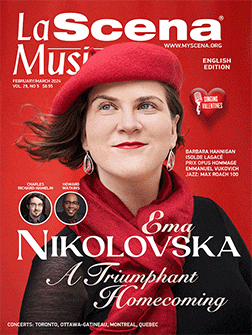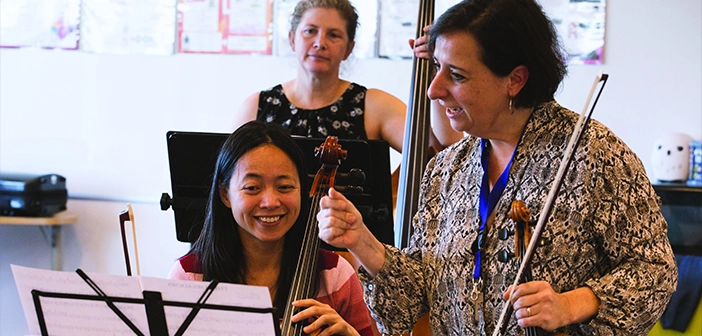
This page is also available in / Cette page est également disponible en:
![]() Francais (French)
Francais (French)
Greeted by the sounds of violins tuning, the smell of fresh coffee, and the welcoming smiles of a diverse staff, families make their way to dance, art, theatre, and music classes at the Préville Fine Arts Centre every Saturday morning. Located at Collège Notre-Dame-de-Lourdes in Longueuil, just across the river from Montreal, mornings at the centre kickstart a creative and stimulating weekend routine for many local families.
“Having all of the fine arts classes in one place, taught at both recreational and higher levels of training, is quite rare for a community arts organization” says the centre’s General Director, violinist Veronica Thomas.
Founded in 1974 by her mother Belva Boroditsky-Thomas, a former opera singer who had studied at the Glyndebourne Festival and sung at the BBC prior to moving to Montreal with her husband, the Préville Arts Centre has served the Saint-Lambert community as a bilingual arts education organization and charity for 50 years. Since the beginning, the centre’s core values have been to make arts education accessible to everyone; to provide a broad range of art and music classes in one location; and to bring communities together in sharing the arts and promoting cultural understanding and respect.
Préville was founded at a time when the school boards in Quebec were divided by religion—Catholic and Protestant—reflecting a demographic language barrier. “This was a crucial time for policies promoting bilingualism and my mother was part of that movement. As the first female chairperson of any school board in Quebec, she pushed for the implementation of one of the very first French immersion programs in Quebec and in Canada,” says Thomas. “She was a visionary, a pioneer, and an activist for the arts, language, equality, and inclusion.”
These values continue to be the centre’s main pillars. “We have a wonderfully diverse population on Saturdays: culturally, linguistically, and socioeconomically” says clarinetist Maria Gacesa, the centre’s General Manager. Through its’ charitable organization, the centre carries on Belva Thomas’s legacy by bringing the highest quality arts education to as many people as possible for the lowest price, says Gacesa.
One of the main objectives of the Préville Fine Arts Centre charity is to provide financial aid to families to send their children to summer camp. “We have helped thousands of families over the years access our activities. It is one of our biggest challenges to find support to cover the cost of these bursaries,” explains Thomas. Financial aid is provided to hundreds of families through the Belva Thomas Charity Bursary every year.
Along with funding the charity, a major challenge has been location. Throughout its 50-year history within the Saint-Lambert community, Préville has always been dependent on the flexibility and availability of spaces at various schools or venues. “We would set up at a school, stay there for several years, and our clientele would come to that location. However, if something changed at an administrative level, it often meant we would have to go,” leaving behind scores of students and teachers who could not follow or adapt, explains Thomas.
A possible solution to this problem, she says, is building a partnership with other cultural and community organizations to own a multi-purpose art and cultural centre equipped with spaces for teaching, learning, as well as a fine-art performance hall. “At this moment there is no viable concert hall on the South Shore of Montreal, and we need a space dedicated to that end,” adds Thomas.
One of the goals of the 50th anniversary gala concert is to fundraise in support of their bursary programs and to raise money for a permanent home. Several local and regional celebrities have agreed to donate their time and perform on this occasion, chiefly among whom is Christian-Marc Gendron, a star in the Quebec pop music scene. Alumni guitarist Adam Cicchillitti and Metropolitan Orchestra flautist Jocelyne Roy will be performing as well. “We wish to connect all members of Préville’s community, both past and present, to bring everyone together for a big celebration of our achievements in the last 50 years,” says Gacesa.
Since 2019, when the general management of the centre had been passed on to the founder’s daughter, violinist Veronica Thomas, the Préville Fine Arts Centre has seen a revival in terms of the growth and scope of activities and services offered. New blood came in 2020 with the arrival of clarinetist Maria Gacesa, general manager, and violinist Heather Shnarr, outreach director. All three women are working musicians and bring a fresh entrepreneurial mindset to their work managing the centre; they see Préville as a “50-year-old start-up.”
“My history with Préville started as a student, then I became a teacher, and then I was on the board. I was always involved in some way. When the position of general director became available, I said, ‘well, I’m up for the challenge! How hard can it be?’ I think I was a bit naïve; it was a very, very steep learning curve for me,” says Thomas who is entering her fifth year at the head of the non-profit.
Much like her mother before her, she spotted and recruited fresh talent. “As an entrepreneur,” says Gacesa, who came in 2020 right as the COVID-19 pandemic hit, “not knowing what you don’t know can be a very helpful thing. All pandemic-related things aside, it was an exciting time at Préville – being a part of that brainstorming and creative surge was fun for me, it fit well with my artistic history and my beliefs in the value of democratization of arts accessibility.”
An example of the way the new management’s business outlook helped Préville grow over the last five years is the creation of an online platform during the pandemic. At a time when most arts and cultural programs underwent severe cutbacks, Préville expanded its customer base by redirecting its in-person classes to the online format. “Technologically we adapted thanks to Alexander Somma, our IT specialist. We all worked together closely to build this online platform for the summer camp which operated like a virtual school with multiple classrooms where students could go from one class to another. We started to understand which classes were best suited for online learning and we created new programming,” explains Thomas.
Another way the new management has ensured growth is through partnerships. In addition to its traditional programming in music, visual art (which includes digital art and robotics), and theatre, Préville can now boast a thriving dance academy, directed by Jamie Malysh, who joined the centre in 2020. Community partnerships abound, with local schools, and other organizations. As the year-long program grows, so does the Préville summer camp, a cornerstone in the centre’s economic sustainability. Additionally, there has been so much demand for outreach programming that the centre has founded Préville Productions to present workshops and performances in schools and community settings, reaching 10,000 students in its first year.
A healthy revenue stream ensures that highly qualified teachers can be retained, providing optimal learning experiences for Préville students. Through a combination of government support and activity revenue, the centre offers highly competitive rates to its employees. For Thomas, respecting artists by making sure they can work in good conditions is a priority in maintaining the centre’s reputation and standards, and in ensuring that her mother’s mission carries on well into the 21st century.
For more on the Préville Fine Arts Centre:
www.centrepreville.org
Playlist
This page is also available in / Cette page est également disponible en:
![]() Francais (French)
Francais (French)
















